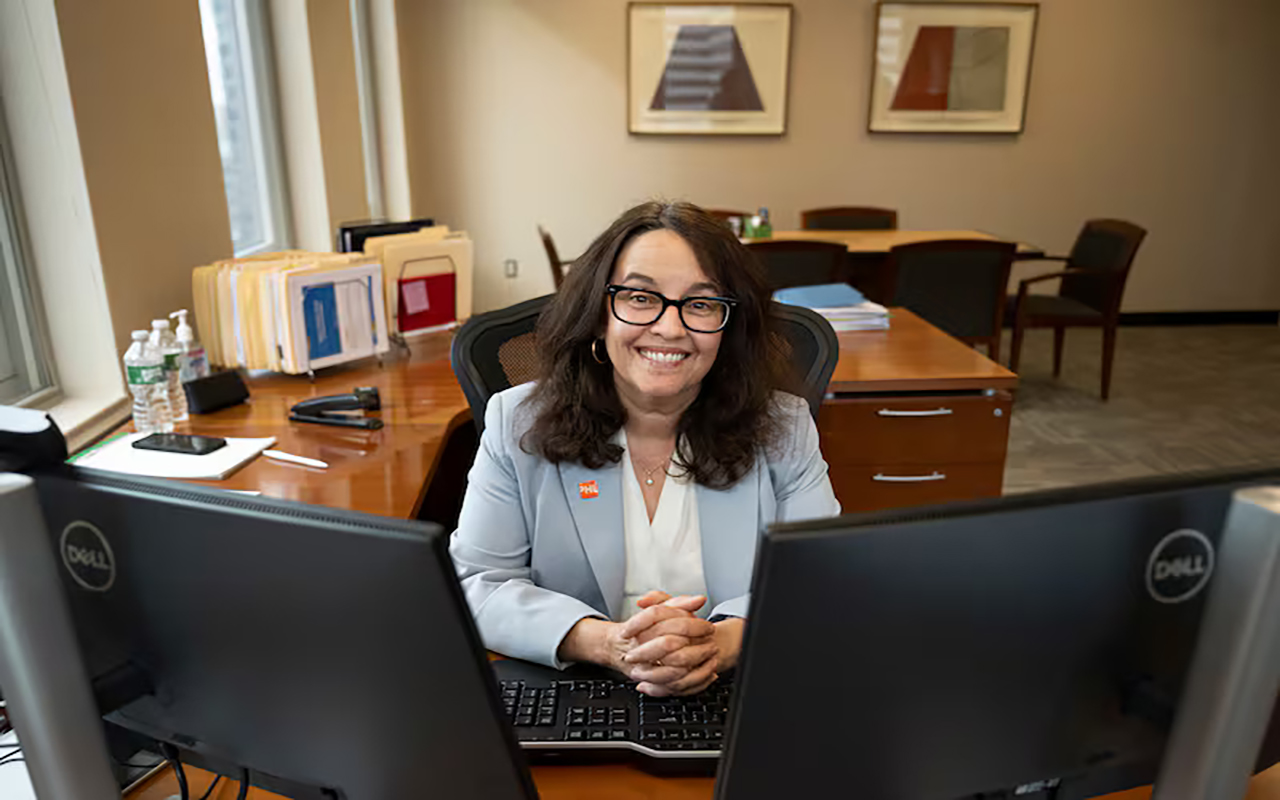
The Rooms Project: Recovery doesn't have to be a struggle
The Rooms Project is a way that Jillian Bauer gives “recovery a voice” through the stories of experience, strength, and hope she often heard in “the rooms” of…
On a humid Tuesday morning in Bucks County, in the surrounding neighborhood, a cul-de-sac setting, the only noise that can be heard is a water fountain from across the street.
A backpack slung over her shoulder and a folding chair in one hand, Jillian Bauer, creator of The Rooms Project, walks up the stairs of Independence Lodge Sober Living, a recovery house.
The Rooms Project is a way that Bauer gives “recovery a voice” through the stories of experience, strength, and hope she often heard in “the rooms” of recovery support groups and meetings.
After scrolling through her phone, checking to make sure that she has the right address and time, a man looking to be in his late 30s invites Bauer into the house.
She sits in the kitchen, waiting for her interviewee Bryan Kennedy, the owner and founder of Independence Lodge Sober Living.
Bauer started The Rooms Project just a few years ago, in March 2014 after celebrating a year of sobriety. She had struggled with drugs and alcohol during her early teenage years up until she was 29.
“I didn’t go to treatment, but I ended up going to a 12-step program because of somebody who I very loosely knew on Facebook, who was very open about being in recovery,” Bauer said. “So when I was feeling really desperate on the day after my last drink I reached out to this person and asked what was it that I needed to do in order get help.”
That’s when the idea of The Rooms Project initially began to form. During Bauer’s first year of recovery she was heavily involved in a 12-step fellowship, a set of guiding principles, originally developed by Alcoholics Anonymous (AA) for recovery from addictive or other behavioral problems. Bauer is still involved in the fellowship today.
It was at these meetings where those who were addicted, whether it be alcohol or drugs, would share personal stories about their experience, what it was like and what it felt to be in recovery.
“I thought that was a really compelling storytelling format, I mean it’s obviously been working since 1935 when AA was founded and so I was really drawn to that way of telling stories and listening to stories,” Bauer said. “So I put up a Facebook post and asked if anyone would be willing to be photographed, first it was supposed to be a photography project and when I got to my first photo session this woman told me her life story and it was a really incredible moving story and I was like ‘Oh my God. I didn’t even bring a recorder, like I teach journalism and I’m not even recording this right now.’”
Bauer ended up going back to meet the woman and recording her story and soon after began recording the stories of others from that point forward.
The project has definitely evolved over the last couple of years, she said, though the reason of why she started the project remains the same.
“The way media portrays addiction has a huge impact of the public’s perception of addiction, and so I think at this point I’ve realized that the more important mission is to focus on telling stories about solutions to addiction as opposed to focusing on stories about active addition.”
Once addicted
Bauer admitted that she had a double life when she was addicted to alcohol. She’s been sober for three years but when she was drinking she was still able to do well in her undergrad college career, even being able to work through multiple jobs.
She ran a photography company that she created while still an undergrad. After she graduated, Bauer began teaching at Temple University as an adjunct and would usually use her occupations as a way to convince herself that she was not an alcoholic.
“During a majority of my college years, I had a really hard time with drinking and drug use,” Bauer said. “Then I graduated and it became a weekend thing and then towards the end it started spreading out and my weekends were like Thursday through Saturday and then Thursday through Sunday, and they started to creep out into the week.”
Friendships would fizzle out, romantic relationships wouldn’t last and there was always drama at family gatherings. All results of Bauer’s alcohol addiction and eventual drug use.

“I’m sure in someway it affected my work, but I was able to get by like that for a while,” she said. “My anxiety was out of control, I’m prone to anxiety and I started to use drinking as a solution to my anxiety, but it wasn’t working because I was getting so much more anxiety from my drinking.”
Bauer said she felt anxious and depressed all of the time. Her whole life revolved around drinking. From what she would be drinking to what bar she would be going to that night.
Bauer started seeking medication that she could use to patch up the anxiety she was constantly feeling but soon it began to feel as if she had to have something in her body just to function.
“Toward the end of my drinking I was sitting at my parent’s house, I would always go to their house to escape my drinking and the city,” Bauer said. “I would hide in their bathroom to collect myself. And hiding in their bathroom I made this list of stuff that I wanted in my life, and it wasn’t ambitious, it was literally like, I want to get haircuts on a regular basis, I want to make up my bed. They were the most basic things that a human being just does naturally.”
Renewed
After a few minutes of waiting, Kennedy arrived. Apologizing for his late arrival. After a brief conversation and quick tour around the house, Bauer sets up her recorder and begins listening to Kennedy’s story.
Kennedy introduced himself as a person in long term recovery and promised that he would do his best to share his experience of “strength and hope.”

“I grew up in a town called West Chester, Pa, had two loving parents, one loving sister,” Kennedy began. “I grew up in a household that entertained quite a bit when I was younger. From a very young age I watched my family and neighbors have a lot of social events.”
Describing his home as “cookie cutter,” Kennedy added that his home resembled that of many around that time. From the outside to the inside, even in which direction there would be a playroom for the kids.
Except in Kennedy’s home, there was a bar.
“From a very young age I watched a lot of people have fun, smiles on their faces and a lot of belly laughs,” Kennedy said. “I saw a lot of fun and with each one of those people I saw a cup in their hands and I knew for some reason when I got old enough I wanted to have one of those cups in my hand and find the happiness that these people seemed to have found.”
Bauer listened intently to Kennedy’s story, stopping him only a few times because of the extra noise the mic was picking up. Kennedy’s story is touching as he explains how he experienced his first taste of beer at the age of 10 when filling up a pitcher for his grandmother to how he finally “spent time” with his father.
When Kennedy finishes up his story and Bauer stops the recorder, she sets him up for a few pictures.
The chair that Bauer brought with her is used at all her sessions for The Rooms Project. Kennedy sits in it as Bauer instructs him on how to pose. In the style of AA meetings, she’ll have the person sit in the chair and tell her their story, taking a picture afterward.
After the photo is taken, sometimes the person being interviewed will sign the back of the chair.
“It’s been interesting because I made that list in my parent’s bathroom and then fast forward, I’m just over three years into my recovery and at that point so much has started to change,” Bauer said.
Bauer is traveling now, something that she had always wanted to do. It’s one of the many ways that she meets people to interview, like Kennedy, for The Rooms Project.
So far Bauer has interviewed over 100 people and continues to teach at Temple University. She’s also getting married this year.
After the quick photo shoot, Kennedy grabs a permanent marker and signs his name on the back of the chair like so many have before him.
“Recovery is possible for anyone. I’ve met people that were definitely written off as completely hopeless to a lot of people,” Bauer said. “A couple of guys that I’ve met were in Ryker’s Island, homeless, all of these things and now they’re fully functional members of society. And so for anyone really, I just want them to know that they can recover and there is always hope. It’s OK to ask for help because there is help out there.”










LEAVE A COMMENT: